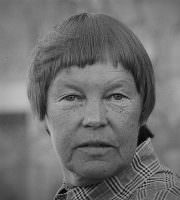by May Swenson
"Feel me to do right,— our father said on his deathbed.
We did not quite know—in fact, not at all—what he meant.
His last whisper was spent as through a slot in a wall.
He left us a key, but how did it fit? "Feel me
to do right.— Did it mean that, though he died, he would be felt
through some aperture, or by some unseen instrument
our dad just then had come to know? So, to do right always,
we need but feel his spirit? Or was it merely his apology
for dying? "Feel that I do right in not trying,
as you insist, to stay on your side. There is the wide
gateway and the splendid tower, and you implore me
to wait here, with the worms!—
Had he defined his terms, and could we discriminate
among his motives, we might have found out how to "do right—
before we died—supposing he felt he suddenly knew
what dying was. "You do wrong because you do not feel
as I do now— was maybe the sense. "Feel me, and emulate
my state, for I am becoming less dense—I am feeling right
for the first time.— And then the vessel burst,
and we were kneeling around an emptiness.
We cannot feel our father now. His power courses through us,
yes, but he—the chest and cheek, the foot and palm,
the mouth of oracle—is calm. And we still seek
his meaning. "Feel me,— he said, and emphasized that word.
Should we have heard it as a plea for a caress—
a constant caress, since flesh to flesh was all that we
could do right if we would bless him?
The dying must feel the pressure of that question—
lying flat, turning cold from brow to heel—the hot
cowards there above protesting their love, and saying,
"What can we do? Are you all right?— While the wall opens
and the blue night pours through. "What can we do?
We want to do what's right.—
"Lie down with me, and hold me, tight. Touch me. Be
with me. Feel with me. Feel me to do right.—
Last updated April 01, 2023




